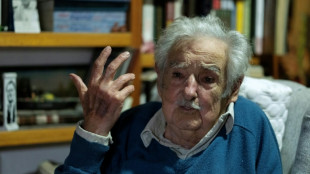
-
 Kamala's coda: What's next for defeated US VP Harris?
Kamala's coda: What's next for defeated US VP Harris?
-
Chiefs hold off Raiders to clinch NFL playoff berth

-
 Australia's Hazlewood out of 2nd India Test
Australia's Hazlewood out of 2nd India Test
-
Trudeau in Florida to meet Trump as tariff threats loom

-
 Jihadists, allies breach Syria's second city in lightning assault
Jihadists, allies breach Syria's second city in lightning assault
-
Trudeau in Florida to meet Trump as tariff threats loom: media

-
 Hunter shines as Hawks top Cavs again
Hunter shines as Hawks top Cavs again
-
Southampton denied shock Brighton win by dubious VAR call

-
 Alarm over high rate of HIV infections among young women, girls
Alarm over high rate of HIV infections among young women, girls
-
Swiss unveil Euro 2025 mascot Maddli

-
 Bears fire coach Eberflus after latest agonizing NFL defeat
Bears fire coach Eberflus after latest agonizing NFL defeat
-
Rallies mark one month since Spain's catastrophic floods

-
 Arnault family's Paris FC takeover completed
Arnault family's Paris FC takeover completed
-
Georgian police stage new crackdown on pro-EU protestors

-
 'We're messing up:' Uruguay icon Mujica on strongman rule in Latin America
'We're messing up:' Uruguay icon Mujica on strongman rule in Latin America
-
Liverpool dealt Konate injury blow

-
 Van Nistelrooy appointed Leicester manager
Van Nistelrooy appointed Leicester manager
-
Verstappen brought back to earth in Doha after F1 title party

-
 Global wine output to hit lowest level since 1961
Global wine output to hit lowest level since 1961
-
Norris boosts McLaren title hopes with sprint pole

-
 Big-hitting Stubbs takes satisfaction from grinding out Test century
Big-hitting Stubbs takes satisfaction from grinding out Test century
-
Romania recounts presidential ballots as parliamentary vote looms

-
 French skipper Dalin leads as Vendee Globe passes Cape of Good Hope
French skipper Dalin leads as Vendee Globe passes Cape of Good Hope
-
Chelsea not in Premier League title race, says Maresca

-
 Brazil's Bolsonaro aims to ride Trump wave back to office: WSJ
Brazil's Bolsonaro aims to ride Trump wave back to office: WSJ
-
France requests transfer of death row convict held in Indonesia: minister

-
 'Mamie Charge': Migrants find safe haven in Frenchwoman's garage
'Mamie Charge': Migrants find safe haven in Frenchwoman's garage
-
Iconic Uruguayan ex-leader hails country's swing left as 'farewell gift'

-
 Thousands rally in Georgia after violent police crackdown on pro-EU protesters
Thousands rally in Georgia after violent police crackdown on pro-EU protesters
-
Shared experiences make Murray 'perfect coach', says Djokovic

-
 Iran, Europeans to keep talking as tensions ratchet up
Iran, Europeans to keep talking as tensions ratchet up
-
Inflation-wary US consumers flock to 'Black Friday' deals

-
 France shows off restored Notre Dame after 'impossible' restoration
France shows off restored Notre Dame after 'impossible' restoration
-
South African bowlers strike after Sri Lanka set big target

-
 Namibia reopens polls after election chaos in ruling party test
Namibia reopens polls after election chaos in ruling party test
-
Georgia police arrest dozens in clashes with pro-EU protesters

-
 US stocks rise on Black Friday
US stocks rise on Black Friday
-
Leclerc on top for Ferrari in Qatar GP practice

-
 Jihadists, allies enter Syria's second city in lightning assault
Jihadists, allies enter Syria's second city in lightning assault
-
Amorim puts faith in Mount to turn around Man Utd career

-
 Guardiola will not 'run' from Man City rebuild
Guardiola will not 'run' from Man City rebuild
-
Assisted dying campaigners, opponents rally at UK parliament

-
 Durable prop Healy set to carve name in Irish rugby history
Durable prop Healy set to carve name in Irish rugby history
-
Macron unveils Notre Dame after 'impossible' restoration

-
 Traumatised Spain marks one month since catastrophic floods
Traumatised Spain marks one month since catastrophic floods
-
Yen rallies, euro up on rising inflation data

-
 Attack-minded Spurs boss Postecoglou says: 'You'll miss me when I'm gone'
Attack-minded Spurs boss Postecoglou says: 'You'll miss me when I'm gone'
-
Syria jihadists, allies shell major city Aleppo in shock offensive

-
 Macron inspects 'sublime' Notre Dame after reconstruction
Macron inspects 'sublime' Notre Dame after reconstruction
-
Arsenal must be near-perfect to catch Liverpool, says Arteta


After the floods, a wave of disease plagues Pakistan
His head haloed by a whirlwind of mosquitoes, Aamir Hussain stands on the roof of his home in southern Pakistan surveying the fetid floodwaters all around.
Four months after the start of record monsoon rains linked to climate change, the standing water has curdled into a pestilent soup breeding malaria, cholera and dengue.
The UN has warned of a "second wave" of catastrophe, with the risk that deaths from water-borne disease and malnutrition will outstrip the 1,700 drowned and electrocuted in the initial cascade.
As dusk arrives in Hussain's submerged village in Dadu district of Sindh province, so do the bugs, and the gamble that they will infect his wife and two children.
"The mosquitoes bite a lot and we fall sick," said the 25-year-old, atop a brickwork compound framing a courtyard awash with putrid, sucking mud.
His brother, who shares this home, has already ventured off the roof to treat his sick children at hospital with borrowed cash.
"Some of our nets are torn now so we are worried," said Hussain, whose infant son has fallen ill.
Sindh has been worst-hit by the catastrophic flooding which put a third of Pakistan underwater, displaced eight million, destroyed or damaged two million homes, crippled 1,500 hospitals and clinics and caused an estimated $28 billion in damages.
- Cascading disaster -
Climate change minister Sherry Rehman said this week that more than 20 million people are still in need "with futures that are entirely precarious". Eight million of those require "urgent medical services", she said.
Zahida Mallah has already been tipped over the edge.
In a bleak camp south of Dadu, outside the city of Hyderabad, the 35 year-old explained she is in mourning for her twin two-month-old sons.
One died on the day AFP visited, the other around two weeks ago at a separate camp.
They were killed by "colds", she said, after sleeping out in the open. She was offered a tent only after it was too late.
"We just keep floundering," she lamented.
Nearby, the city of Johi is corralled by water, accessible via a ramshackle flotilla of canoes powered by greasy petrol engines.
Residents rallied to save the city as the rains lashed down, heaving sandbags into a snaking makeshift levee. But it cannot hold back the disease.
In a desperately rundown emergency clinic, a doctor treats unresponsive seven year-old Kashaf, a suspected malaria patient lying on dirty sheets with a clutch of pharmaceuticals at her feet.
"Perhaps it's a natural disaster, or perhaps we are being tested by God, but whatever it is we are the victims," said her father, 20 year-old Dildar Mastoi.
Under a black scarf his daughter's eyes have rolled back into her head. She no longer recognises her parents -- doctors say a fever has affected her brain.
Barely adults themselves, her mother and father fled rising waters twice before settling in a camp where they drink from a well they suspect is contaminated by flood water.
"From early evening until dawn, throughout the whole night, the mosquitoes are overwhelming," said Kashaf's mother, 19 year-old Bashiran Mastoi. "When the night approaches we start to worry."
"Life at the camp is immensely miserable," she said in a vigil on her child's sickbed.
Medic Manzoor Shahani said there has been a "surge" in malaria, gastro illnesses, and dengue while "most of the patients are children and pregnant women".
- 'The hidden fever' -
Before the floods southern Pakistan was already devastated by grinding poverty. Now aid only sporadically penetrates the patchwork swampland, while the true number of those in need has yet to even be discovered.
Doctors and officials offer contradicting figures, as they grapple to understand the scale. In Dadu the official death toll is just 23, but everyone privately agrees the real figure must be far higher.
"This is devastation beyond the government's approach," said provincial health monitor Faheem Soomro, as young doctors tally the day's fresh patients at a boardroom table.
Half of malaria tests are coming back positive and most homes have suspected cases.
Sindh has recorded 208,000 cases of malaria so far this year, a dramatic rise from 2021, when cases were reported.
Left untreated -- as it certainly is in the stranded swathes of Sindh -- malaria can quickly turn fatal. In a normal year there are 50,000 deaths from malaria in Pakistan.
Soomro describes it as "the hidden fever". It has vague flu-like symptoms -- as the mosquito-borne parasite enters the liver and bloodstream, in severe cases swelling the brain.
The healthcare disaster is most easily monitored in camps -- there are 19 in Dadu -- where the luckiest of the displaced live in row upon row of hundreds of simple A-frame tents.
In one of the "tent cities" home to around 5,000, residents clamour for treatment in a blustery gazebo where doctors test them for malnutrition and malaria, as others offer vaccinations and female health advice.
Soomro estimates 60 percent of the displaced once stayed in camps like this, but three quarters of those have scattered back to the sodden hinterlands to remake their lives, often out of reach of aid efforts.
Outside the camps the dispersed can be seen everywhere -- in tents and on daybeds clustered by highways and near scummy stagnant lakes.
- 'Unaware' victims -
The monsoon torrent came after Pakistan was seared by a spring heatwave, with pockets of Sindh sporadically suffering temperatures of 50C (122F).
Extreme weather events are increasing in severity as a result of climate change, scientists say.
Pakistan -- the world's fifth largest population -- is responsible for only 0.8 percent of global greenhouse emissions but it's one of the most vulnerable to extreme weather caused by global warming.
In Johi, community activist Ali Pervez laments how the worst affected Pakistanis are unable to advocate for climate justice.
"They are totally unaware," he said.
"There is not any quality education [so] that we can easily make aware, empower our people."
A.Gasser--BTB
